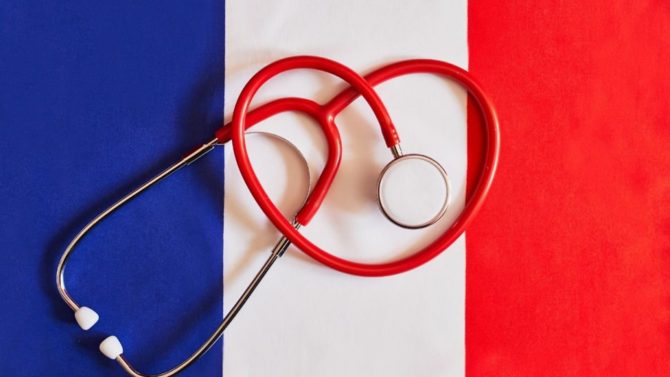Guide to French healthcare post-Brexit

How to access health cover in France post-Brexit, from paying for some treatments to applying for your ‘carte vitale’ and having your own private health insurance
French healthcare has a well-deserved reputation for providing high-quality treatment and comprehensive preventative care. However, the system can be difficult to navigate and it operates quite differently from that of the UK which can come as a surprise to many new arrivals. It is a good idea to familiarise yourself with how the system is run before you need its services; there is nothing more stressful than trying to grasp how something works when you are not feeling 100%.
STATE HEALTHCARE
If you are resident in France you must have health insurance and state healthcare is not free. It is funded by both the state and patient contributions and patients may pay upfront for some treatments (this is often the case with X-rays for example), with the French national insurance fund repaying part of the costs at a later date.
UK nationals living in France usually access the French healthcare system either by making French social security contributions through their employer or as a self-employed person, or by registering a UK-issued S1 form with the local CPAM office. If you are employed you can apply as soon as you begin working and will be covered on the same basis as a French citizen. Those resident in France prior to 31 December 2020 also enjoy the same freedom to join the French system after residency of at least three months.
People arriving from the EEA (European Economic Area) will be able to access the system on the same basis as French nationals, however, UK nationals who relocate to France from 2021, no longer benefit from EEA rights and will need a visa to live in France and this requires that they have adequate private health insurance in place. After three months of legal residence they can apply to join the French health system and they are also entitled to health cover if they take employment or set up a business; however, only certain types of visa permit the holder to work.
CERTIFICATES AND CARDS
Within the EEA certain nationals may qualify for a certificate of health entitlement which provides access to French healthcare on the same terms as French nationals. These certificates are known as ‘S’ forms and the S1 (formerly E106/E121) is often issued to someone whose family relocates to France while they continue to work in the UK or another EU country and those who relocated to France prior to 2021 continue to benefit from their former rights.
For people of retirement age and who are in receipt of a state pension from their home country, S1 cover is provided on a permanent basis and those on long-term incapacity benefit (ESA) under the age of retirement are also entitled to apply for an S1. If you are a posted or ‘detached worker’ (i.e. employed or self-employed in the UK, but temporarily sent to an EEA country, you can access French healthcare using an EHIC, GHIC or S1 form. The HMRC helpline will clarify which documents you will need to get healthcare while posted abroad and whether or not you require a UK-issued A1 certificate to show that you pay national insurance in the UK.
In all cases the S1 needs to be registered with the local CPAM and if you’re using an EHIC or GHIC card you’ll need to show this when you go to any appointments. You will also be able to use an EHIC or GHIC card if you are studying in France to get medically necessary healthcare until the end of your study period in France.
AUTOMATIC ENTRY
Those who are in employment or business in France automatically gain entry into the state health system, whether as an EEA citizen or a ‘third-country’ national. If you have relocated to France and plan to run a business then your affiliation to the French health system will happen automatically as part of the process of business registration and this includes those who register as a micro-entrepreneur. Business registration will take place at one of the registration centres, known as the Centre de Formalités des Entreprises (CFE) and can also be done online.
The local health authority (CPAM) will subsequently contact you after which point you and your family will all be covered for healthcare; there is no need for both husband and wife to set up a business as both are covered, provided one of them has a registered business. However an economically inactive spouse/civil partner of a business owner or salaried person in France does now need to make their own application for health cover, rather than remaining as a dependent of their partner.
Once self-employed, you will pay social security contributions, which includes those for your health cover. If you are already self-employed and retain substantial links to your home country, you can work in France for up to two years while retaining affiliation to your existing home social security and health system. There are certain conditions that must be met in order to qualify for this, so you will need to provide HMRC with full details as each case is decided on an individual basis.
Once you have registered you will be covered under the PUMA – protection universelle maladie – scheme which guarantees healthcare cover to everyone residing in France in a ‘regular and stable’ manner and avoids any breaks in healthcare provision in case of job loss for example.
If you are not employed you may have to pay into PUMA yourself and further details can be found on the Ameli website.
Registration is fairly simple. You will need to download a Demande d’ouverture des droits à l’assurance maladie (CERFA N° 15763*02) which is available online (formulaires.service-public.fr/gf/cerfa_15763.do) and then complete and sign the form. It does state that this is not required by S1 holders, but local CPAM offices and the Ameli helpline currently seem to require it. You will need to provide hard copies of the following documents: your passport, birth certificate (the long version which includes parents’ names, marriage certificates, the Lettre des impôts britanniques au sujet d’attestation des droits (this is the notice from HMRC that you should have requested when informing them of your move to France) and your Attestation des droits (S1). You will also need a telephone or utilities bill, proof of address and a RIB (the IBAN number) from your French bank account.
You can either post your application or make an appointment at the local office and take it in person. Unless you are at a huge distance this is probably the better option as any mistakes can be quickly rectified and the staff are generally very helpful.
CARTE VITALE
Once you’ve registered, you’ll get a temporary social security number and you will then receive a document called an Attestation de droits à l’assurance maladie. This confirms your right to French state healthcare and your French social security number. When you have received that document, you can apply for your French state healthcare card, the famous green carte vitale. You will need to take this with you whenever you visit a doctor, pharmacy, hospital or specialist. Getting a physical carte vitale can take a while, often up to six months, so if you need healthcare before receiving the card you will need to give your social security number and ask your healthcare provider for a feuille de soins – this is a brown form which you will need to send to your local CPAM office in order to be refunded for any treatment you’ve paid for. Even with a carte vitale you may occasionally be given a feuille de soins and it’s always a good idea to make a copy of these before sending them off and even put a note in the diary to check that you have received the appropriate refund.
State healthcare in France is not free; you may have to pay some of the cost of treatment so make sure you understand what you’ll be charged, how much of that you’ll get back through state healthcare cover and whether or not you require top-up health insurance. This is known as a mutuelle and the policy covers most or all of the excess not refunded by the state. Being aware of costs applies equally to those travelling to France and travel health insurance is essential.
GLOSSARY
CPAM – Caisse primaire d’assurance maladie
EHIC – European Health Insurance Card
GHIC – UK Global Health Insurance Card
EEA – European Economic Area
CEAM – la carte européenne d’assurance maladie
TOP TIP
Always apply for your CEAM or GHIC well before any planned travel dates as these can take a while to be processed during busy periods. If you live close to the border and make regular trips across, whether for work or leisure, it’s a good idea to make sure you always have a valid card with you – just in case!
USEFUL NUMBERS
• English-speaking CPAM helpline number (France) 09 74 75 36 46
• Requesting S1 as a retired state pensioner? Then you only need to deal with the DWP, you must request an application form by phone from NHS Overseas Healthcare Services.
• NHS Overseas Healthcare Services – (UK) 0191 218 1999 (Monday to Friday, 8am to 6pm; Saturday, 9am to 3pm)
• Requesting S1 as a UK-based worker residing in France, or as a posted worker? Start by contacting HMRC. They will need to check your status before instructing the DWP to issue the S1. Call HMRC on (UK) 0191 203 7010.
Share to: Facebook Twitter LinkedIn Email


